Publications
For submission of articles or Working Papers to CEsA, please send an email to:
comunicacao@cesa.iseg.ulisboa.pt
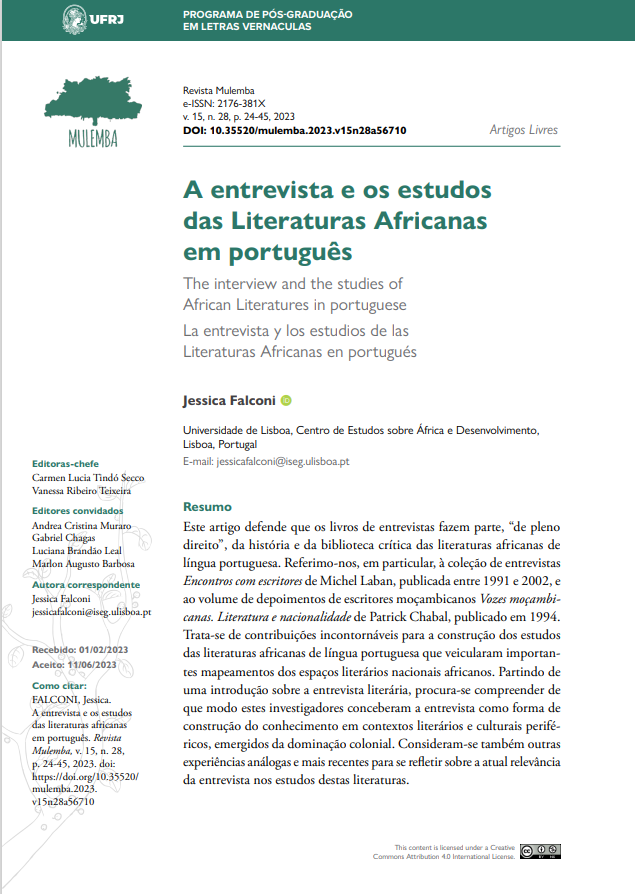
A Entrevista e os Estudos das Literaturas Africanas em Português
Abstract:
This article argues that interview books are a “full right” part of the history and critical library of Portuguese-language African literature. We refer, in particular, to the collection of interviews “Encontros com Escritores” by Michel Laban, published between 1991 and 2002, and the volume of testimonies by Mozambican writers “Vozes Mozambicanas. Literature and nationality by Patrick Chabal”, published in 1994. These are unavoidable contributions to the construction of studies of Portuguese-language African literatures that conveyed important mappings of African national literary spaces. Starting from an introduction to the literary interview, we seek to understand how these researchers conceived the interview as a way of building knowledge in peripheral literary and cultural contexts, emerging from colonial domination. Other similar and more recent experiences are also considered to reflect on the current relevance of interviews in studies of these literatures.
Quotation:
FALCONI, J. A entrevista e os estudos das literaturas africanas em português. Revista Mulemba, v. 15, n. 28, p. 24-45, 2023. doi: https://doi.org/10.35520/mulemba.2023.v15n28a56710
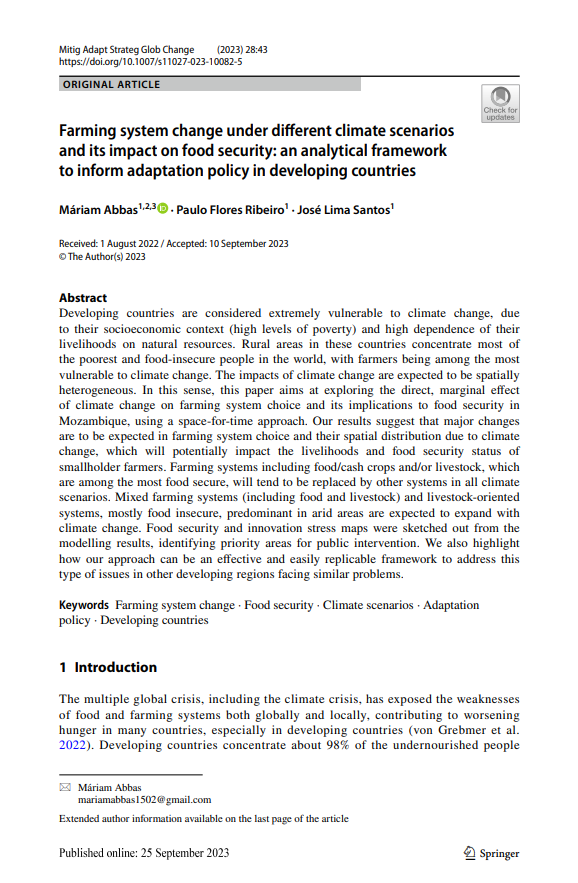
Farming System Change Under Different Climate Scenarios and its Impact on Food Security: an analytical framework to inform adaptation policy in developing countries
Abstract:
Developing countries are considered extremely vulnerable to climate change, due to their socioeconomic context (high levels of poverty) and high dependence of their livelihoods on natural resources. Rural areas in these countries concentrate most of the poorest and food-insecure people in the world, with farmers being among the most vulnerable to climate change. The impacts of climate change are expected to be spatially heterogeneous. In this sense, this paper aims at exploring the direct, marginal effect of climate change on farming system choice and its implications to food security in Mozambique, using a space-for-time approach. Our results suggest that major changes are to be expected in farming system choice and their spatial distribution due to climate change, which will potentially impact the livelihoods and food security status of smallholder farmers. Farming systems including food/cash crops and/or livestock, which are among the most food secure, will tend to be replaced by other systems in all climate scenarios. Mixed farming systems (including food and livestock) and livestock-oriented systems, mostly food insecure, predominant in arid areas are expected to expand with climate change. Food security and innovation stress maps were sketched out from the modelling results, identifying priority areas for public intervention. We also highlight how our approach can be an effective and easily replicable framework to address this type of issues in other developing regions facing similar problems.
Quotation:
Abbas, M., Ribeiro, P.F. & Santos, J.L. Farming System Change Under Different Climate Scenarios and its Impact on Food Security: an analytical framework to inform adaptation policy in developing countries. Mitig Adapt Strateg Glob Change 28, 43 (2023). https://doi.org/10.1007/s11027-023-10082-5

História de São Tomé e Príncipe de Meados do Século XIX ao Fim do Regime Colonial (1852-1974): As plantações, economia, cultura e religião
Abstract:
This book explains the reasons that led the Portuguese to recolonize the São Tomé and Príncipe islands from 1852 onwards and the strategies they adopted to institutionalize the new colonial order in the archipelago. They removed the natives from ownership of land and institutions and introduced the plantation economy model around which all economic and social life began to revolve, with the territory being divided between the populations of large plantations and the native populations. Work and land were exploited to the point of exhaustion, with mistreatment, racial discrimination, and a progressive decline in soil productivity. The production crisis emerged and exposed the limits of the plantation economy model. There were several attempts to forcefully hire native labor, which generated many conflicts and led to the “Batepá” massacre of 1953. This event raised the awareness of nationalists for the independence of the archipelago, which occurred on July 12, 1975. The book also addresses culture and religion as central elements that shape São Tomé and Príncipe society and identity.
Quotation:
Espírito Santo, A. (2023). História de São Tomé e Príncipe – De Meados do Século XIX ao Fim do Regime Colonial (1852-1974): As plantações, economia, cultura e religião. Lisboa: Nimba Edições.
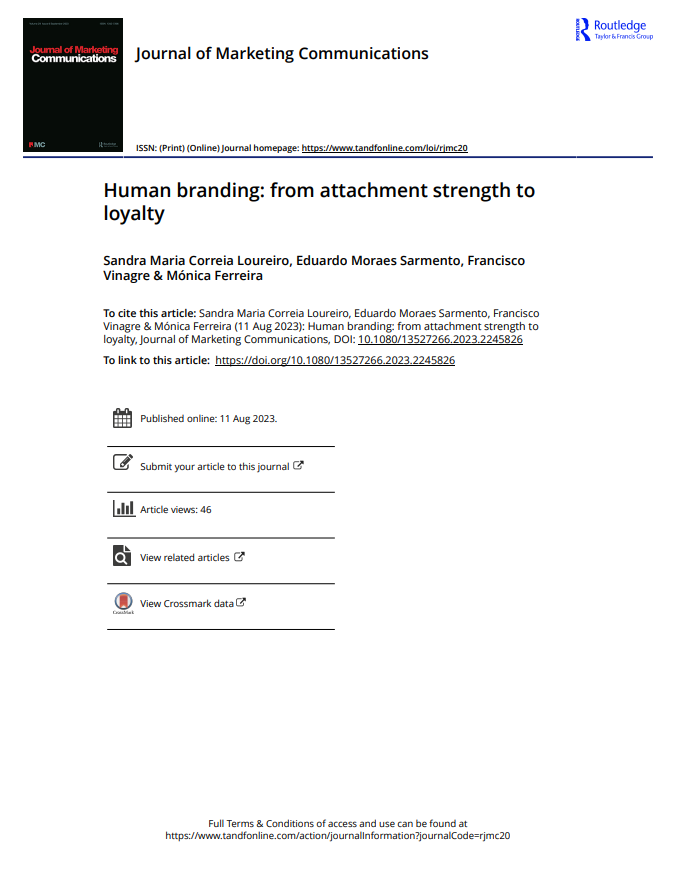
Human Branding: From attachment strength to loyalty
Abstract:
Human branding is everywhere and within every individual. With the increase in the importance of technology and social media, human branding becomes increasingly relevant, but it is still a branding concept with much room to explore. Celebrities, such as actors and athletes, are the greatest examples of human brands, and with social media managing public image is key to success. This study aims to analyze the process by which attachment strength influences loyalty through intimate and public engagement. Thus, a sample of 321 participants, collected through social media platforms, allowed us to treat data and test the hypotheses of the proposed model. Relatedness is the most relevant driver of attachment strength and the flow from attachment to loyalty through public engagement.
Quotation:
Loureiro, Sandra Maria Correia … [et al.] (2023) “Human Branding: From attachment strength to loyalty”. Journal of Marketing Communications, DOI: 10.1080/13527266.2023.2245826
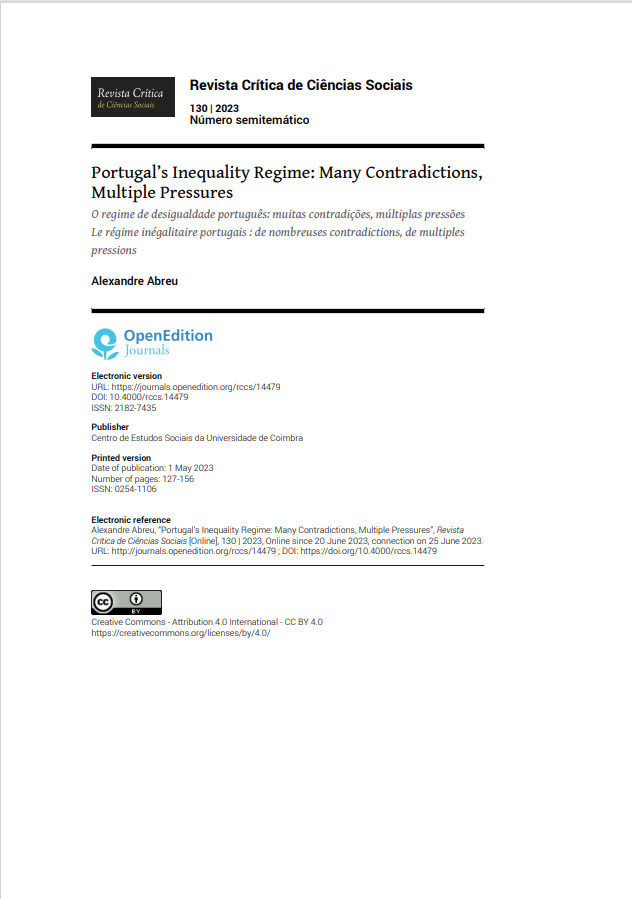
Portugal’s Inequality Regime: Many contradictions, multiple pressures
Abstract:
This paper applies the concept of inequality regime, in the tradition of the Regulation School, to the analysis of the patterns and drivers of socioeconomic inequality in Portugal in the last few decades. Key empirical patterns are identified with respect to income inequality, top and bottom incomes, wealth inequality, monetary poverty and non-commodified provision of basic goods. We then discuss several underlying processes and mechanisms, namely the capital-labour relation, classification struggles, financialisation, redistribution, and welfare, to account for the identified empirical patterns. We conclude that Portugal’s inequality regime is remarkably contradictory and argue that the country’s success in curbing most measures of inequality in recent times is especially vulnerable to a variety of pressures.
Quotation:
Abreu, A. (2023). “Portugal’s Inequality Regime: Many contradictions, multiple pressures”. Revista Crítica de Ciências Sociais, 130:127-156
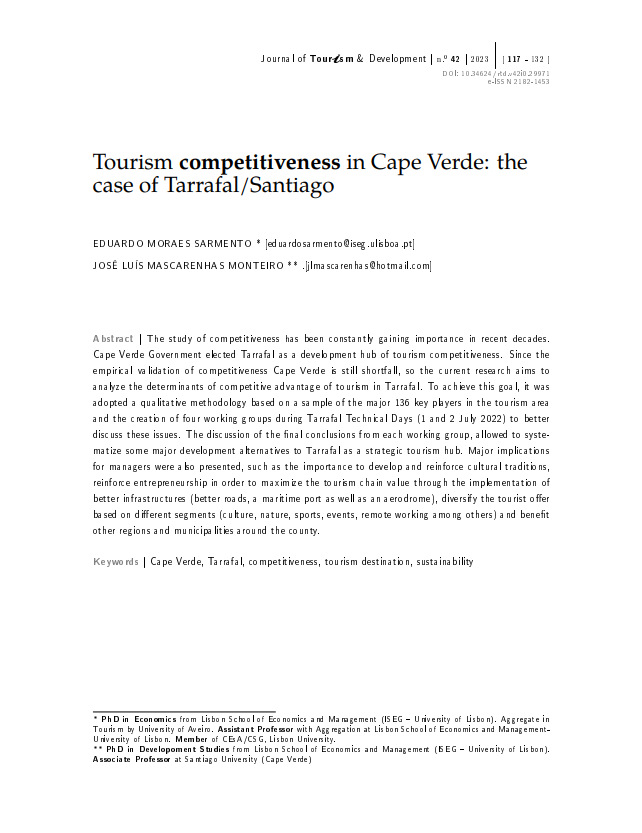
Tourism Competitiveness in Cape Verde: The case of Tarrafal/Santiago
Abstract:
The study of competitiveness has been constantly gaining importance in recent decades. Cape Verde Government elected Tarrafal as a development hub of tourism competitiveness. Since the empirical validation of competitiveness Cape Verde is still shortfall, so the current research aims to analyze the determinants of competitive advantage of tourism in Tarrafal. To achieve this goal, it was adopted a qualitative methodology based on a sample of the major 136 key players in the tourism area and the creation of four working groups during Tarrafal Technical Days (1 and 2 July 2022) to better discuss these issues. The discussion of the nal conclusions from each working group, allowed to systematize some major development alternatives to Tarrafal as a strategic tourism hub. Major implications for managers were also presented, such as the importance to develop and reinforce cultural traditions, reinforce entrepreneurship in order to maximize the tourism chain value through the implementation of better infrastructures (better roads, a maritime port as well as an aerodrome), diversify the tourist o er based on di erent segments (culture, nature, sports, events, remote working among others) and bene t other regions and municipalities around the county.
Quotation:
Sarmento, Eduardo Moraes e José Luís Mascarenhas Monteiro (2023). ” Tourism competitiveness in Cape Verde : the case of Tarrafal/Santiago”. Revista Turismo & Desenvolvimento, 42:117-132
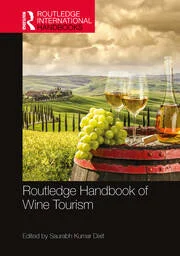
Exploring Co-creation Process in the Wineries: The relevance of social partner characteristics
Abstract:
In a global market, the exchange is regarded as one of the most important strategic resources that are critical for business company success (Hammervoll 2012; Johnson 1999; Powers and Reagan 2007). Hence, it is not a surprise that producers, distributors, retailers, customers, and even competitors join forces to co-create value solutions. With the business environment becoming more competitive, a dyadic perspective of buyer–seller relations is increasing. Partners should be concerned about joining forces and working together to improve their joint performance and add value to their offers (Cannon et al. 2010). In sum, the success of a company can be influenced by the style of the relationship that is developed with other players (Arranz and de Arroyabe 2012; Cunha, Loureiro, and Rego 2015a; Monteiro, Guerreiro and Loureiro 2019; Terpend and Ashenbaum 2012). Following this appeal for research, this chapter aims to explore how distributors and wine producers describe the personal and organizational social capabilities as facilitating facets of relationship quality (RQ) (it is an issue that depends on confidence, satisfaction, commitment, and trust). The wine sector is selected as a field of research because it has unique features which have not yet been deeply studied and could explain management specificities: 1 Portugal is an old wine country full of tradition and heritage, ‘in which the wine culture has been flourishing for centuries’ (Loureiro and Kaufmann 2012, p. 331). 2 The wine sector has not been deeply analyzed and studied in previous research. 3 This sector plays an important role in the national economy, and the recognition of the quality of the work carried out in this sector is being acclaimed internationally. This chapter is organized as follows: after this introduction of our topic research, we present the theoretical background that supported this study, followed by a description of the methodology. The following sections discuss research findings from the empirical study, and the implications for managers of this study are discussed. Finally, limitations and new research directions are suggested.
Quotation:
Sarmento, E. M, Loureiro, S. M. C., and Cunha, N. Exploring Co-creation Process in the Wineries: The relevance of social partner characteristics. In: Dixit, S.K. (Ed.). (2022). Routledge Handbook of Wine Tourism. Routledge. https://doi.org/10.4324/9781003143628
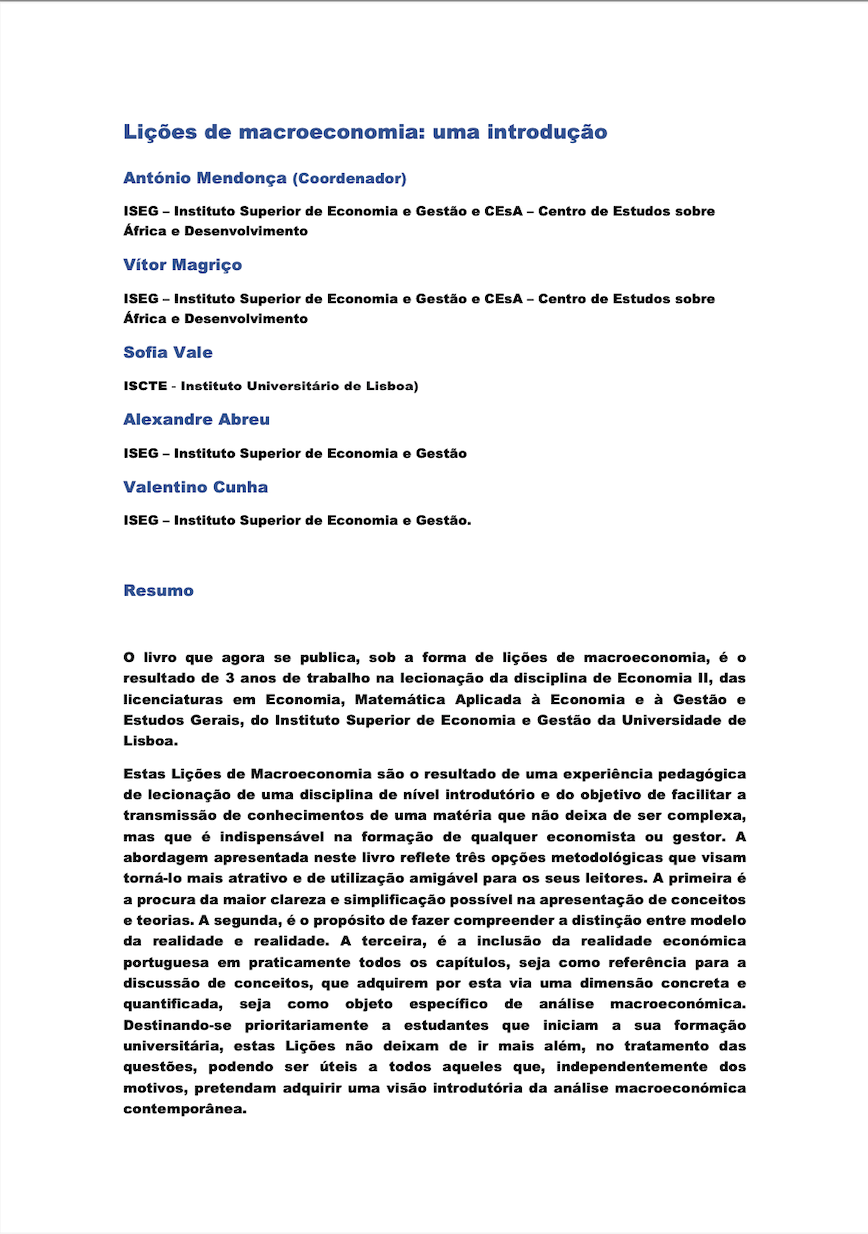
Lições de macroeconomia: uma introdução
Abstract:
The book that is now being published, in the form of lessons in macroeconomics, is the result of 3 years of work in teaching the discipline of Economics II, of the degrees in Economics, Mathematics Applied to Economics and Management and General Studies, at the Instituto Superior of Economics and Management at the University of Lisbon. These Macroeconomics Lessons are the result of a pedagogical experience of teaching an introductory-level subject and the objective is to facilitate the transmission of knowledge in a subject that is nonetheless complex, but which is indispensable in the training of any economist or manager. The approach presented in this book reflects three methodological options that aim to make it more attractive and user-friendly for its readers. The first is the search for the greatest possible clarity and simplification in the presentation of concepts and theories. The second is the purpose of making the distinction between the model of reality and reality understood. The third is the inclusion of the Portuguese economic reality in virtually all chapters, either as a reference for the discussion of concepts, which acquire a concrete and quantified dimension in this way, or as a specific object of macroeconomic analysis. Aimed primarily at students starting their university education, these Lessons do not fail to go further in dealing with the issues, and may be useful to all those who, regardless of their motives, wish to acquire an introductory vision of contemporary macroeconomic analysis.
Quotation:
Mendonça, António (Coordenador) e Vitor Magriço … [et al.] .(2021) . “Lições de macroeconomia: uma introdução”. Edições Silabo, Lisboa: p. 451.
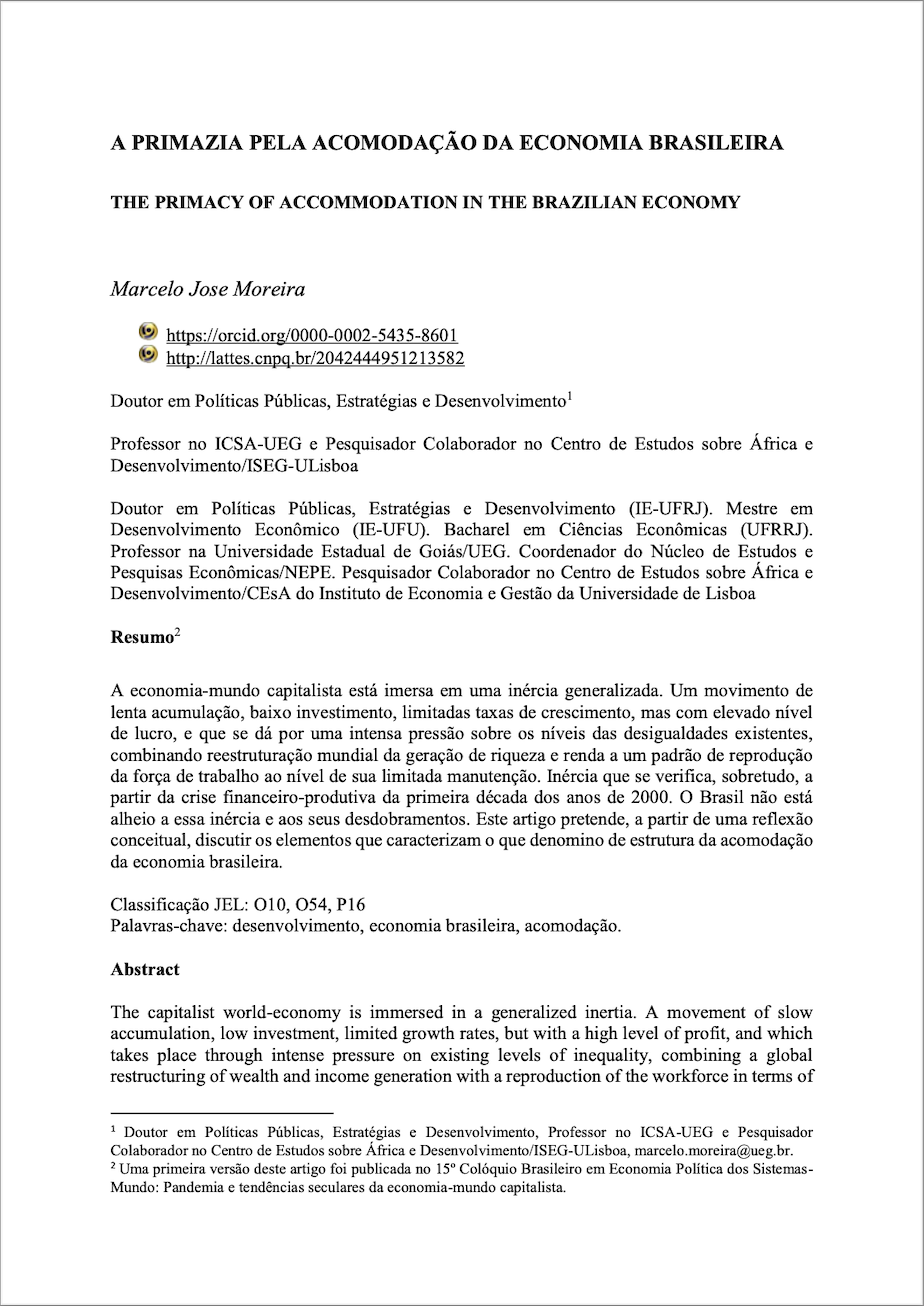
The primacy of accommodation in the Brazilian economy
Abstract:
The capitalist world-economy is immersed in a generalized inertia. A movement of slow accumulation, low investment, limited growth rates, but with a high level of profit, and which takes place through intense pressure on existing levels of inequality, combining a global restructuring of wealth and income generation with a reproduction of the workforce in terms of its limited maintenance. Inertia that can be seen, mainly, from the productive-financial crisis of the first decade of the 2000s. Brazil is not oblivious to this inertia and its consequences. This article intends, from a conceptual reflection, to discuss the elements that characterize what I call the accommodation structure of the Brazilian economy.
Quotation:
Moreira, Marcelo José (2021). “A primazia pela acomodação da economia brasileira”. Revista de Economia da UEG. 17(2), p. 44-65
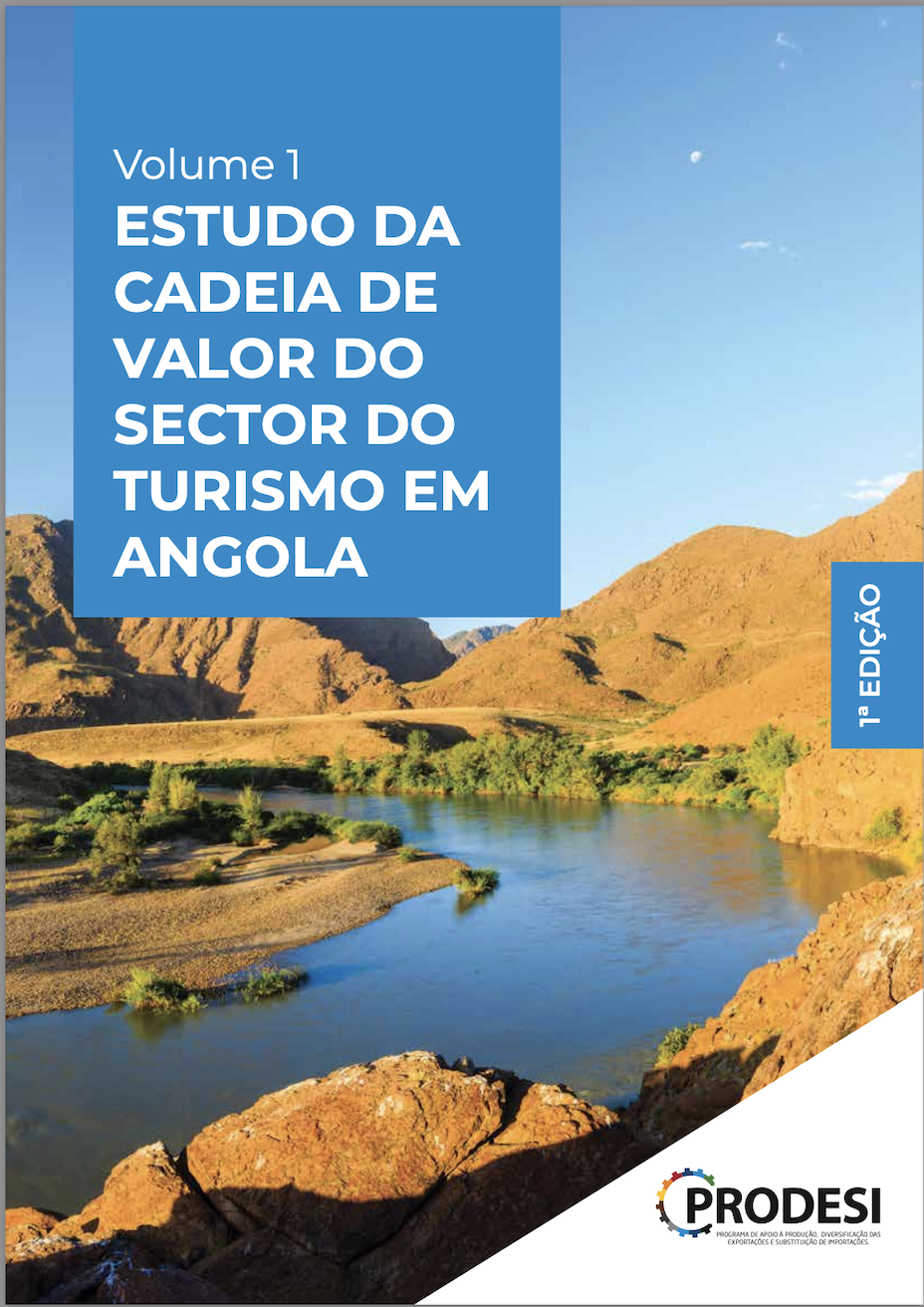
Estudo da cadeia de valor do setor do turismo em Angola – 1ª Edição
Abstract:
Tourism has grown steadily at an international level, both in terms of the number of tourists and in terms of revenue generated. However, Angola has not followed this trend, so it is not surprising that the weight of tourism in the country’s GDP is reduced (less than 1% in 2018). This situation is all the more serious as the countries in the region all have a much higher contribution from tourism to the GDP than Angola. The aim of this report is to identify the main weaknesses of the value chain that underpins tourism activity and to propose a set of measures and recommendations to be implemented within the scope of PRODESI.
Quotation:
Sarmento, Eduardo Moraes e PAHL Consulting (2020). Estudo da cadeia de valor do sector do turismo em Angola. Volume 1. Banco Africano de Desenvolvimento e Ministério da Economia e do Planeamento.





